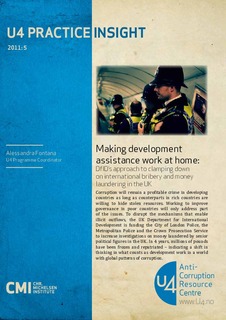| dc.contributor.author | Fontana, Alessandra | |
| dc.date.accessioned | 2018-01-04T08:16:59Z | |
| dc.date.available | 2018-01-04T08:16:59Z | |
| dc.date.issued | 2011-06-28 | |
| dc.identifier | oai:www.cmi.no:4072 | |
| dc.identifier.citation | Bergen: Chr. Michelsen Institute (U4 Practice Insight no. 2011:5) 12 p. | |
| dc.identifier.uri | http://hdl.handle.net/11250/2474695 | |
| dc.description.abstract | Corruption will remain a profitable crime in developing countries as long as counterparts in rich countries are willing to hide stolen resources. Working to improve governance in poor countries will only address part of the issues. To disrupt the mechanisms that enable illicit outflows, the UK Department for International Development is funding the City of London Police, the Metropolitan Police and the Crown Prosecution Service to increase investigations on money laundered by senior political figures in the UK. In 4 years, millions of pounds have been frozen and repatriated – indicating a shift in thinking in what counts as development work in a world with global patterns of corruption. | |
| dc.language.iso | eng | |
| dc.publisher | Chr. Michelsen Institute | |
| dc.relation | U4 Practice Insight | |
| dc.relation | 2011:5 | |
| dc.relation.ispartof | U4 Practice Insight | |
| dc.relation.ispartofseries | U4 Practice Insight 2011:5 | |
| dc.relation.uri | https://www.cmi.no/publications/4072-making-development-assistance-work-at-home | |
| dc.subject | International Drivers of Corruption | |
| dc.subject | United Kingdom | |
| dc.title | Making development assistance work at home: DfID's approach to clamping down on international bribery and money laundering in the UK | |
| dc.type | Report | |
